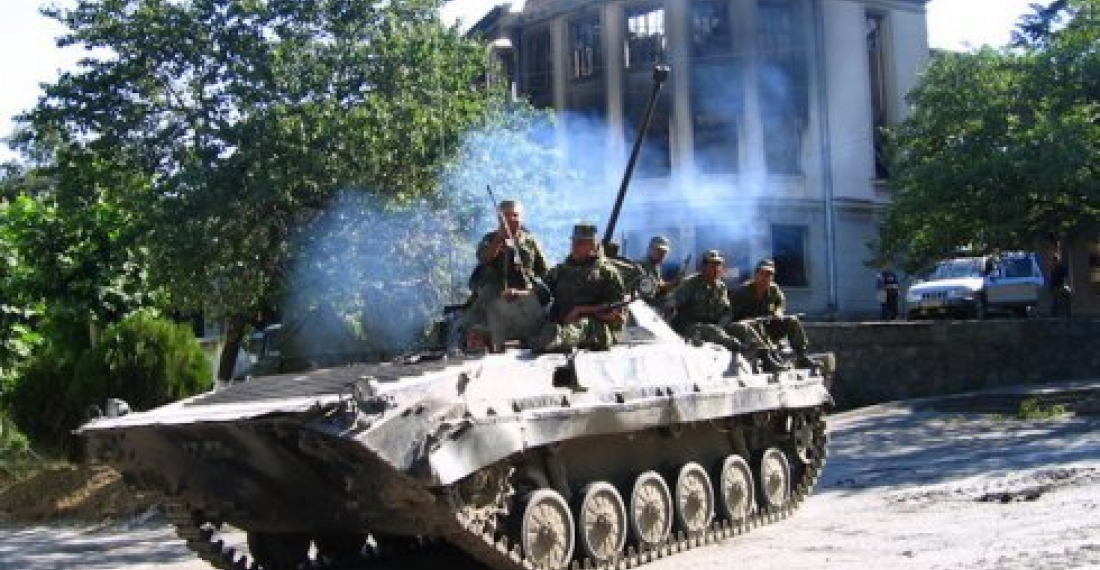The Georgia-Russia war broke out eight years ago today, at a time when Olympics were also getting underway and the United States was also looking forward to an exciting presidential election. The war was remarkable event for many reasons. It created two territories in limbo, neither Georgian, Russian or independent. It changed the direction of Georgian politics. Most of all, it punctured the fragile equilibrium that had developed from the end of the Cold War, when fifteen different republics went in many different directions, and Russia went from being a superpower and hegemon to being just one sovereign state among many.
The war sent shockwaves across the region and the world. Several hundred soldiers and civilians were killed, and many more wounded. The war redrew the map of the region, with the territories of Abkhazia and South Ossetia coming under de facto Russian control, a situation that does not look like changing any time soon. Both Georgia, which started the war by shelling Tskhivali in South Ossetia, and Russia, by reacting disproportionately, share the blame.
Georgia and Russia are very different places compared to eight years ago. Georgia, looking ahead to parliamentary elections in two months, is an increasingly stable democracy, going in the direction it wants. Russia is autocratic, economically chaotic, and internationally isolated. It has embarked on a series of foreign escapades to distract attention from its oil-price triggered slump, most notably in Crimea.
The diplomatic positions of South Ossetia and Abkhazia are ambiguous and unresolved. Only Russia and a smattering of other tiny allies have recognized the self-declared republics. This year, both countries have toyed with the idea of holding referendums to join Russia, while Georgia still claims South Ossetia and Abkhazia as its own. It is difficult to imagine either Georgia renouncing its claims, or the citizens of South Ossetia and Abkhazia accepting Georgian control once more, making the dispute seem intractable. It is certainly not going away any time soon without a radical shift in the diplomatic and political situation. It is not clear what a realistic peace plan would look like.

In an era in which most wars are between states and non-state actors, or between rival factions in a civil conflict, the five-day war in 2008 was remarkable the way it saw two states that were middle-income, and to some extent democratic, go head to head in an old-fashioned interstate war. The responsibility for starting the war has been hotly contested. Both sides blame one another. According to the European Union investigation prepared by Swiss diplomat Heidi Tagliavini, both sides behaved inappropriately.
Since the fall of the Soviet Union, Abkhazia and South Ossetia had had a distinct culture and language to Georgia, with a degree of autonomy. There were Russian armed peacekeepers, and international unarmed peacekeepers, in both territories. In the run up to August 2008, success in restoring control in Adjara in the west of Georgia, and an improving economy, made Tbilisi more confident. Fiercely pro-western President Mikhail Saakahasvili increased military spending. Russia, its economy also improving, began to focus about its influence overseas, for example by granting Russian passports to South Ossetians and Abkhazians dissatisfied with a government in Tbilisi it saw as nationalistic and distant.
Tensions along the boundaries between Georgia and Abkhazia and South Ossetia, which had been increasing over the spring and summer, came to a head late at night on 7 August. According to Tagliavini’s report, the trigger for war came when Georgian troops shelled Tskhinvali in South Ossetia, trying to retake it. Ground forces then moved into South Ossetia on August 8th, the day traditionally marked as the start of the war.
Putin quickly flew back from the Olympics in Beijing, and Russian air and ground forces halted the Georgian advance. “Much of the Russian military action went far beyond military defence,” said Tagliavini. Not content with pushing Georgian forces out of South Ossetia, Russian forces went deep into Tbilisi controlled territory, including the towns of Gori and Zugdidi. Many civilians were killed in intensive shelling by both sides.
After five days of very heavy fighting, French President Nicholas Sarkozy, who held the rotating presidency of the European Council at that time, brokered a ceasefire, which was eventually signed by both Georgia and Russia. Since then, the boundary has grown sharper. A fence has been build and it is increasingly difficult for those in South Ossetia to visit relatives in Georgia and vice versa. The status quo ante bellum looks increasingly solid.
The conflict created huge personal, economic and military loss to a region still slowly making its way out of the shadow of communism, and escaping the memory of the ethnic violence of the early-1990s. It ripped open wounds which were beginning to heal.
Eight years on, and the wounds do not look like healing any time soon. South Ossetians and Abkhazians do not want to belong to Georgia. Georgian society will never accept formally relinquishing South Ossetia and Abkhazia. Russia’s foreign policy is unpredictable. Georgia still faces many internal challenges. There is no obvious route to reconciliation. Eight years on from the war which changed everything, little has changed, and that may be the case for a very long time.






